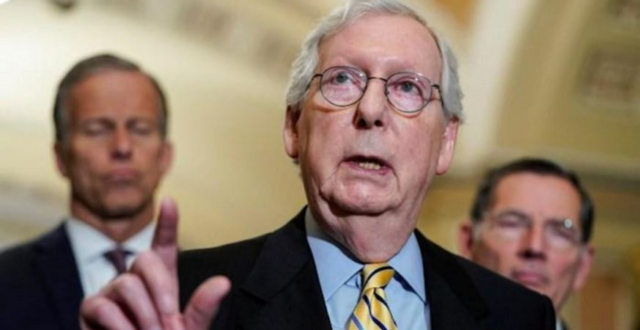Voting Rights | Republicans Block Voting Legislation: In a critical procedure vote on Tuesday evening, the Senate Republicans blocked major voting rights laws, launching a high priority filibuster for Democrat people after the party fought to secure full backing for this bill.
Voting Rights | Republicans Block Voting Legislation

Democrats Failed To Win In Voting Rights
In a vote of between 50 and 50, Democrats fail to vote for a motion that enables the Senate to move to the bill by 60 votes. Every fifty Democrats voted for the action, but the party won’t win a filibuster by 10 GOP senators.
In recent weeks, Democrats have struggled to get the 50 senators to support their People’s Act in the Caucus. Still, the leadership said hours before the vote that Senator Joe Manchin from West Virginia will vote on the motion for the motion because they agreed on his compromise proposition. In their efforts to focus their efforts on the united opposition of GOP to an election revision, Democrats hope to unite on a signature problem that they have been campaigning for years.
“Let’s do our work. Let’s do our work. Resist the easy way, hide behind Senate proceedings and discuss voting rights with the American people, “Raphael Warnock, the Democrat Senator of Georgia, said ahead of the critical vote.
People Act
The People’s Act includes a wide range of access to voters, funding campaigns and ethics. The proposal would automatically and on a day-to-day basis create voter registration. That limits the removal of voting rights and establish independent new district boards.
Manchin, who promise to replace a vote with a bill, said that his scaled-back release expands early voting and mail-in and adds voting ID requirements – although many Democrats oppose voting ID rules.
Bill Rejected And Retaliated For Changes
While Democrats acknowledged that the bill would fail, they reiterated. Their calls for changes in voting, particularly given GOP-led legislatures passing measures. It imposes restrictions or limits on voters. And as a way to highlight the importance of the issue. Vice President Kamala Harris, leading the White House voting rights, chaired the chamber.
Republicans, however, also remained unified and rejected the bill, arguing that such legislation was an attempt at federal government-run elections. They pushed back on arguments that new law-signed election rules in states like Georgia, Texas, and Arizona are “voter suppression.” Critics of these bills claim to place a disproportionate burden on colour voters.
Democrats Vs Senate
New York’s Senate Majority Leader Chuck Schumer said Democrats would continue to pursue voting rights legislation amid a GOP blockade. But didn’t detail how they would move forward, especially with the filibuster intact and without enough support to eliminate it.
But in the face of another GOP-led filibuster, Democrats and progressive activists are raising pressure once again to get rid of the stall tactic as several reluctant Democrats, including Manchin, reiterate their support for keeping it. So far, Democrats don’t have the votes to abolish the filibuster and can’t afford any objections.
Arizona’s Democratic Sen. Kyrsten Sinema wrote an op-ed in The Washington Post defending her advocacy for the 60-vote threshold. She argued that, without the mechanism, the Senate could ultimately repeal legislation. Like For the People Act and institute national voting restrictions if Republicans gain majority control.
Defending Filibuster
I would ask: Is it good for the country if we did, to see that legislation cancelled for a few years now. It substitutes for a national elector-id law, or restrictions on voting by mail during federal elections, on minority objections?’ Sinema writes
“This question concerns less the immediate results of any of these Democratic or Republican goals. Which include the likelihood of repeated radical reversals of federal policy. The cementing of uncertainties, deepening divisions and further erosion of US trust in our government.”
But graduates view GOP resistance to a procedure as another reason for eliminating the filibuster. As well as trying at least to gather further momentum in a question shift more to the mainstream of the Democratic Party.
When a minority of the senator’s abuse filibusters stop the Senate even debating critical voting rights, the course of the Senate Democrats becomes clear. Therefore Democrats must move quickly and pass a majority of the Senate-based famous voting law,” said Eli Zupnick, Senate spokesperson.


















































